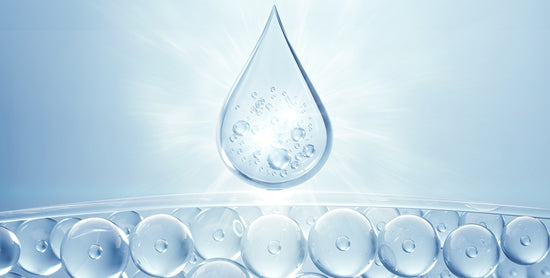If you have red, irritated skin, you could have a damaged skin barrier. Whether your skin is easily irritated, or you have a skin condition like eczema or psoriasis, understanding the skin barrier is the key to healthier, more vibrant skin.
Here’s everything you need to know about your skin barrier, and a few tips on choosing the best skin barrier repair cream for eczema- and psoriasis-prone skin.
What is the Skin Barrier?
The skin barrier is made up of the epidermal barrier and the stratum corneum, two layers of your skin. It’s your body’s way to keep irritants and bacteria out of your body, and keep water and hydration in your skin.
It’s not just a barrier effect though. The skin barrier keeps bacteria at bay thanks to antimicrobial peptides produced deep in the epidermis. They are transported to the stratum corneum where they fight potential pathogens and irritants.

What Does Your Skin Barrier Do?
The skin barrier has multiple functions that are crucial for protecting skin health. A strong skin barrier is vital for maintaining not only the health of your skin, but also your overall well-being. Here are some key roles of the skin barrier:
- It Protects From External Threats: A robust skin barrier acts as a shield, preventing harmful substances, bacteria and allergens from entering your body.
- It Helps Your Skin Retain Moisture: The skin barrier locks in moisture, keeping the skin hydrated to prevent dryness and flakiness.
- It Helps Prevent Infection: An intact skin barrier helps ward off infections, reducing the risk that broken skin from itchy eczema or psoriasis flare-ups will become infected.
- It Helps Regulate Temperature: Your skin barrier aids in maintaining body temperature and preventing excessive heat or cold from affecting your body. This helps during an eczema or psoriasis flare-up when excessive heat can worsen inflammation.
Understanding a Damaged Skin Barrier in Relation to Broken Skin
Your skin barrier works like a fortress to protect your body from the outside world. If you have eczema or psoriasis, your skin barrier may be ‘leaky’. This decreases the integrity of your skin’s defense system. Think of it like a brick wall: If you have a damaged skin barrier, there are gaps between the bricks.

To be more scientific: The skin barrier consists of several layers, with the outermost layer known as the stratum corneum. This layer is composed of corneocytes; skin cells held together by a protein called filaggrin. Filaggrin plays a pivotal role in maintaining the integrity of the skin barrier by binding keratin filaments together, making skin cells strong and flat.
A Damaged Skin Barrier: Impact of Eczema or Psoriasis
When it comes to eczema or psoriasis, the skin barrier can't function as effectively and may become weak. Several factors associated with these skin conditions contribute to weakening of the skin barrier.
Genetics and filaggrin production:
One significant factor is genetics. Many people with eczema or psoriasis have differences in the gene responsible for coding filaggrin. According to the National Institutes of Health, up to 30% of people with eczema exhibit mutations in the filaggrin gene.
When filaggrin production is inadequate, it can have profound effects on your skin. Consider skin cells as bricks. When you have less filaggrin, skin cells lose moisture and shrink, creating gaps between the ‘bricks.’ This means moisture can escape eczema- or psoraisis-prone skin easily, causing dryness and itchiness. This often leads to scratching or rubbing. Unfortunately, these actions can further weaken the already compromised skin barrier.
Also, inadequate filaggrin production can disrupt the skin's pH balance, allowing abnormal bacterial growth. This can trigger immune responses, leading to inflammation and at worst, infection.
Lipids and Ceramide Levels
Fats, known as lipids in the science-world, are vital for a healthy skin barrier. So, if you have eczema or psoriasis, your composition of skin lipids might be slightly varied. These skin conditions also often come with reduced amounts of ceramide, a key substance essential for retaining skin moisture. In fact, studies show that changes in levels of lipids and ceramides in the skin of people with eczema is a key reason why eczematous skin is often more dry and irritated.
To be specific: The stratum corneum lipid barrier is most affected in atopic dermatitis.
If you have eczema or psoriasis, this might sound like doom and gloom. Your skin barrier is inherently susceptible to weakening, and you may have a damaged skin barrier. But, once you know that, you can start your mission to strengthen it as much as possible.
Caring for Your Skin Barrier with Eczema or Psoriasis

If you have eczema or psoriasis, supercharging your skin barrier is an important way you can ease your symptoms. Skin barrier repair is all about preventing moisture loss, which eases the itch and helps prevent broken skin and infection. Using a skin barrier repair cream that’s formulated specifically to supercharge skin protection is key.
How to Repair the Skin Barrier with Glycolipids
Dermatologists and skincare experts are praising a novel new ingredient for its ability to both repair and protect the skin barrier. HYDROSURF™ glycolipid technology is a revolutionary blend of fermented skincare ingredients which strengthens your skin barrier, especially if you have eczema or psoriasis. This means less transdermal water loss across your skin’s surface, resulting in enhanced skin moisture and hydration.
How does HYDROSURF Glycolipid Technology Help With Skin Barrier Repair?

First, HYDROSURF glycolipid technology bolsters your skin barrier’s natural defense mechanisms. It effectively seals in moisture and prevents its evaporation. This intervention helps alleviate the distressing symptoms of dryness and flaking, especially in cases of atopic dermatitis, eczema and psoriasis.
Second, once absorbed, HYDROSURF works synergistically with other ingredients to enhance your skin's moisture retention capacity. The glycolipid technology facilitates the movement of water within the epidermal layers. This boosts your skin’s water content and enables the targeted relief of dry patches associated with eczema, psoriasis and atopic dermatitis.
HYDROSURF is found exclusively in ARCTIVA skincare products. The brand offers a breakthrough line of steroid-free eczema and psoriasis creams formulated with only clean, natural ingredients.
Enhancing the function of your skin barrier by using a skin barrier repair cream is key to managing eczema, psoriasis and other skin irritation. Now you know the crucial role your skin barrier plays in managing irritation and eczema, and how vital skin barrier repair is. So don’t wait.
Boost your skin barrier by using a proven, safe and steroid-free skin barrier repair cream now.
Shop ARCTIVA steroid-free skincare now:






